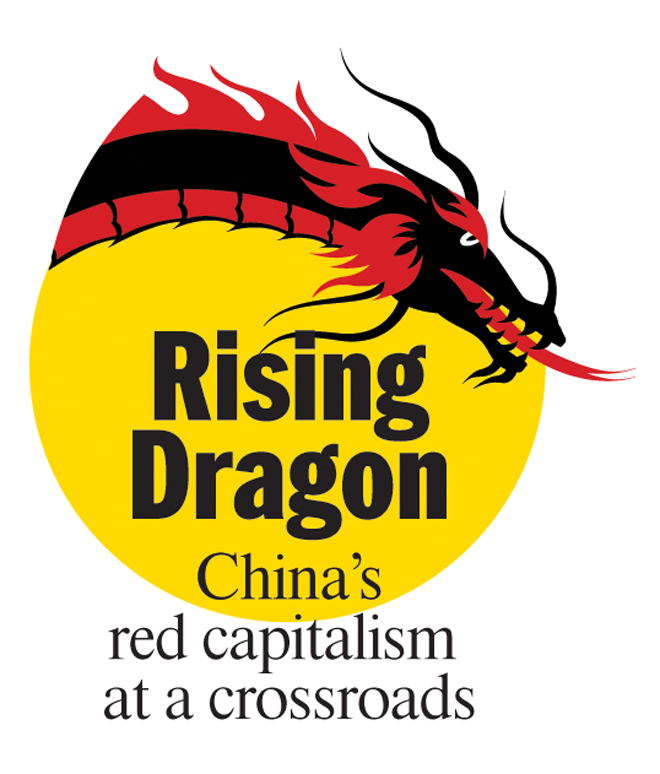 Protesters came with signs depicting Li Ka-shing, Hong Kong’s richest man, to vent their anger about skyrocketing property prices and government policies on July 1, the 14th anniversary of the former British colony’s return to Chinese rule. (Associated Press)
Protesters came with signs depicting Li Ka-shing, Hong Kong’s richest man, to vent their anger about skyrocketing property prices and government policies on July 1, the 14th anniversary of the former British colony’s return to Chinese rule. (Associated Press) Protesters carrying a Goddess of Liberty march through Hong Kong in late May ahead of the 22nd anniversary of China’s crackdown on the pro-democracy movement in Beijing. (Associated Press)
Protesters carrying a Goddess of Liberty march through Hong Kong in late May ahead of the 22nd anniversary of China’s crackdown on the pro-democracy movement in Beijing. (Associated Press)Story Topics
Fourth of four parts
HONG KONG — Chinese political and business leaders are increasingly triumphant after two decades of rapid economic growth that lifted unprecedented millions of people out of poverty and turned the nation into an economic superpower, saying their success proves its political and economic system is superior to the Western model.
 In extensive talks with a series of Chinese leaders, an oft-cited point of criticism is the gridlock and “dysfunction” they see in Washington. They say fawning by U.S. political leaders seeking re-election has created an “entitlement culture” where the public has grown dependent on government largesse. Now, with the United States facing monumental economic and debt problems, the political system has been unable to curb generous entitlement programs or counter the economic downturn.
In extensive talks with a series of Chinese leaders, an oft-cited point of criticism is the gridlock and “dysfunction” they see in Washington. They say fawning by U.S. political leaders seeking re-election has created an “entitlement culture” where the public has grown dependent on government largesse. Now, with the United States facing monumental economic and debt problems, the political system has been unable to curb generous entitlement programs or counter the economic downturn.
But Washington’s political stalemate is not the only subject of derision in private and public conversations in China. Ordinary citizens also have watched aghast as European countries amassed huge and unpayable debts with their unwieldy welfare states. Now, with the public violently resisting reform, these spendthrift countries seem headed for a monumental financial crisis that threatens to shake the entire global economy.
Even in the Westernized enclave of Hong Kong, where leaders are trying to implement democratic reforms, some officials point to the serious difficulties facing the U.S. and unfolding crisis in Europe as evidence that Western democracy does not work or provide lasting well-being for the people.
“A small but influential group holds critical views of democracy” in Hong Kong, said Chris Yeung, news director at the Hong Kong Economic Journal. “The problems in the U.S. have given ammunition to these people.”
By contrast, critics say, the rapid economic progress that China’s authoritarian government engineered in the past two decades through a succession of five-year plans - sweeping aside potential obstacles and opposition through bureaucratic fiat and sometimes brute force along the way - has served most people well.
The self-serving rhetoric of China’s leaders runs against the historic democratic tide rising elsewhere in the world that has spawned the Arab Spring and other movements that have brought pro-Western forces to power.
But leaders in Beijing point out that hopes in the West for a “Jasmine Revolution” by citizens in China have not been realized because most Chinese, they contend, are content with the economic gains they have made. Democracy as carried out in the West, they say, is seen as a threat to that progress and a hindrance of further growth.
“We believe our political system corresponds to China’s needs,” said Liu Qing, an analyst at the China Institute of International Studies, a Beijing think tank that closely mirrors the government line. “It allows us to have economic development, improve living standards and remain harmonious. Ninety-nine percent of Chinese are satisfied with the current situation.”
Ms. Liu told visiting U.S. journalists that Western media coverage of China has been biased, often focusing on the repression of human rights in Tibet or elsewhere rather than the broader picture, where the government has championed “economic rights” for the people - in particular, plentiful jobs in export industries.
“People like political stability” in China, she said. “People have a vivid memory of what chaos means” after experiencing the convulsions of Mao Zedong’s Cultural Revolution in the 1960s. “The prevailing attitude is: Don’t rock the boat.”
The widespread belief in the U.S. that China doesn’t allow free debate also is wrong, she said, pointing to frequent criticisms of the government on Internet blogs and chat rooms by the nation’s 500 million “netizens.” Still, people know they shouldn’t “overstep their limits” by attempting to “overthrow the government,” she said.
China is now at a pinnacle of global leadership and influence as a result of its emergence as an economic superpower, even as the U.S. and other major industrial powers fell into disrepair as a result of the 2008 financial crisis, said Guo Zhenyuan, an analyst at the institute.
China gained the admiration of developing nations around the world with its ability to weather the crisis emanating from the U.S., even emerging from the downturn as the world’s main engine of growth, while its superior economic performance provoked jealousy in the U.S. and other developed nations, he said.
China mocks U.S. political model - Washington Times
No comments:
Post a Comment